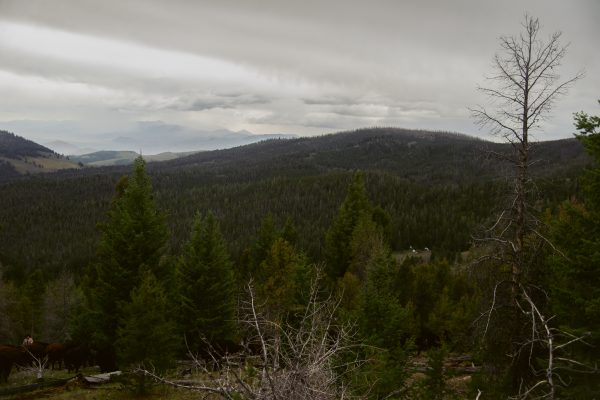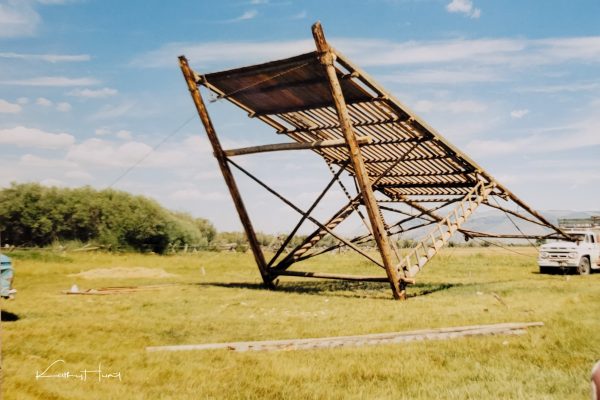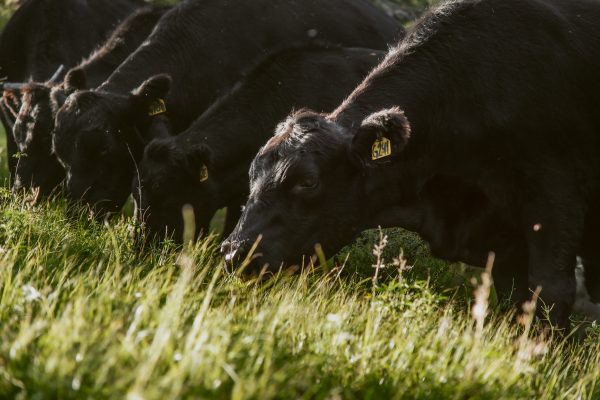The July sun was bouncing along the mountains that formed the western horizon above Idaho’s Lemhi Valley, and Caryl, the kids and I had just finished dinner. The midsummer days in our northern latitudes were long, with light lasting until after 10 PM. Even though it was almost 9:30, I started to pull my boots on for a quick trip up to our high meadows to check the cows. Our old hardwired wall-mount telephone started ringing just as I placed a foot over the worn threshold of the screen door.
I turned around to grab it, as Caryl was still putting dishes away with the oldest kids. I stepped around two more toddler towheads crawling around on the floor, now released from their high chairs, and grabbed the phone. “Hello?”
Initially, heavy breathing was all I heard. Then a raspy low voice, almost whispering into the phone on the other end: “Glenn?”
“Yes?”
More breathing. Labored. Heavy. Mouth too close to handset. Same raspy voice. “Glenn. This is Sam Crandall.” Long pause.
I cringed. I was leasing his place down the river a ways, and whenever he called, it wasn’t for compliments. My brother, Jerry, was running the fences and irrigation sprinklers down there, and we had just finished baling up a nice hay crop. “How ya doin’, Sam?”

“Not real good, Glenn.” He paused and took another long draw of air around his phone. I had been around him enough to know that he’d tipped the whiskey bottle a few too many times. I waited for the shoe to drop on account that this was not new territory; Sam and I had plowed ground like this many times. It was my turn to speak.
“Why not, Sam?”
“Cause I’m hoping you’ll convince me not to go through with it. Somehow, Glenn. Please tell me why not to.”
“Go through with wha…” Sam interrupted me.
“You see, Glenn, I’m looking at your brother’s back through a Weaver 6 power scope. I have crosshairs centered on the middle of his dirty blue T-shirt, and my finger is on the trigger of my .308 Winchester. I could kill him in less than one second. He wouldn’t even know what hit him, Glenn.”
I spoke quickly. “Put the rifle down, Sam.” I listened a second, waiting for a response. Nothing. I broke silence. “What seems to be the problem, anyway?”
Heavy breathing. “It’s just that he comes over here so late, Glenn. Karen and I like to hit the hay early–you know; we ain’t getting any younger, and we get all settled down and he comes a’ hellin’ through our front yard with that little riceburner dirtbike of his. You know. It just ain’t peaceful.”
“Sam–it’s only 9:30.” I took a deep breath. It was going to be OK. I could tell by his tone of voice. “It’s broad daylight. The sun just set. You know he works two jobs, and he’s just trying to make ends meet. I gave you a heads up that he would move pipe in the evening. What do you want me to do?”
Silence, except for breathing. Then: “Well could ya just tell him to come an hour earlier? Karen and I just need some shuteye.”
“Sure, Sam. I’d be happy to. Sorry to cause trouble, partner.”
“No trouble, Glenn. You have a good night.”
“You too, Sam.”
Sam was crazy, but he wasn’t the only one. He was a fairly typical partner in those early days of Alderspring. Our cattle herd had outgrown the 600 acres we had been working the past few years, and we picked up small leases all up and down the long trench the Lemhi River cut through the Rocky Mountains.
It was the way many ranchers who were cattle rich and land poor had to make it. After all, Lemhi County was only 3% private land. The rest was federal land, and you had to be a long term landowner to be able to graze up there, and much of it was high altitude rocky and snow covered peaks. It was a tough country to run cows.
So we took what leases we could round up in the valley; some of them were 40 miles away. We’d place cattle all up and down the valley that presented good native pasture grazing opportunities with no spray programs. It was a good thing those beeves had legs under them, because sometimes we’d trail them for miles on horseback to the next grass. We were dang close to being organic in those days, even with the lease ground, because we used no chemicals on those places either…or on our cows. The problem was that we rarely held on to places for more than three years as required to certify because, well, let me put it this way: it wasn’t the place’s land that had problems.
It was the owners, and in a warped sort of way, I was getting used to it. One old codger pulled out a shotgun on me and told me he’d use it next time I ran my hay baler at night. It was a dry summer, I told him, and needed the dew to keep the leaves from shattering off as I raked and baled it.
“Come back here at night, and I’ll have to kill ya.”
Another of my landlords, who also took to the corn liquor a little too kindly, let about 25 pairs of our our cowherd out and off of his place on to curvy US highway 93 one June day. The cattle trotted for several miles down the road, headed for Montana, and finally bailed off the pavement to a nice meadow owned by George, a retired schoolteacher. Melanie and I responded as quickly as we could when we heard word through the gravevine that our cows were bound for Canada on 93, and had horses caught, saddled and trailered in a jiffy.
We sped on down the valley the 40 miles to where it turned into the Salmon River Canyon. We unloaded in a wide spot along the river, and trotted along in the bottoms between road and river until we spotted our wayward cows high-tailing for darker, thicker and larger trees.
We spied a gate by George’s ranch house that would get us and our steeds down there, and Melanie dismounted to open it. She was already a good hand (perhaps a tad overused) at the seasoned age of 10, and ground tied her mare and ran to the latched gate to let us through.
Right then, Old George came out the front door and intercepted her. He must have heard us ride up from inside the bathroom, because he came down those steps barefoot and dripping, buck naked except for a little white towel loincloth…that was flapping in the breeze. Thankfully, the breeze wasn’t too strong, and things stayed covered. Melanie stood there agape, mouth open in shock.
I broke the awkward silence moment. “Hi George. Mighty fine day, isn’t it? You mind if we ride through to gather our cows?
George didn’t even break stride. After all, nothing could be more normal than chatting with two cowpokes on a lovely day in the front yard. “Absolutely. No problem at all. Just let yourselves in.” He nodded and smiled at Melanie.
“Why thanks, George. Much obliged to you.” I tipped my hat. Melanie didn’t.
He ascended the steps to his door, and turned around. “Oh, and could you latch it behind you when you’re through?”

“No problem, George. Thanks again.”
We got down through the gate, and closed it. Melanie swung a leg up, and gave me a sidelong glance that said “I ain’t sayin’ nothin.”
I grinned. “You kids sure get to see a lot of interesting scenery out on the ranch these days.”
We rode quietly down to the river bottoms. It had been a wet June, and the cottonwood gallery forest along the floodplain was teeming with life. Clouds were scudding in from the western mountains across the river, and it was looking like our glorious spring day could turn out in to rain. We trotted on sand bars along the Salmon River, now swollen with a mix of snowmelt and rainfall.
We spied some tracks in the sand. The cows were ahead of us, and soon, our visual sign was confirmed with them scenting us and crashing through the brush ahead. I called out. “Come on, kids. Let’s go.” The brush popping momentarily stopped as they recognized my call.
They couldn’t see us in the thick underbrush, though, and once we started moving again, quietly as we could on horseback, they spooked and rambled off in the undergrowth. Then we heard the squeak and shriek of barbed wire getting stretched as the cows blew through on to the next river ranch’s property. We rode up to where the cows went over and through. No gates to be seen, and enough wire on the ramshackle, ancient and overgrown fence that we weren’t going to risk bringing our horses through it. I’ve had horses get wire cuts before, and had heard of the nightmare of getting barbed wire caught between their shoe and their foot. It could get ugly in hurry.
I turned back to Melanie. It was starting to rain, and the dull roar of raindrops falling on the broad cottonwood leaves of the canopy overhead made me speak loudly. “Let’s ride back to the truck, load up, and see if we can get ahead of them on the highway.”
She nodded and turned back the way we came. George waved at us as we came through the gate again, this time very well clothed in his living room window. In a few minutes, we were out of the downpour, and in the dry truck with the heat on, lumbering down the 2 lane sinuous travel way that was US highway 93. The road meandered along the foothills for a few miles, and then turned back to join the river.
Traffic, as usual, was very light, so we were able to practically idle along at 15 mph while we scanned the greenery along the river for a telltale patch of black hide that betrayed the presence an Angus cow. Nothing. We were right along the mighty Salmon now, nearly at flood stage. The trees along the opposite shore were about 100 yards away. The wipers pulsed back and forth across the windshield, partly obscuring our view.
It was Melanie who spoke first. “Look!”
I slowed the truck to a crawl, and pulled over on the narrow shoulder. Fog and mist had settled down over the river, and in the murky brush beneath the large cottonwoods on the other side was a group of black cattle with their heads down, grazing with abandon on the lush river bottom grass. We got out in the steady rain, and stood silently, watching them eat. They were too far away to tell if they were ours. Besides, there were nearly 50 pairs over there. We were only looking for 25 or so. I strained my eyes to determine ear tag color, or recognize some markings on them, but the fog and the rain made things too gray.
I cupped my hands around my mouth and called out loudly: “Come on, girls! Come on kids!!”
Immediately about 20 cows looked up from their lush graze, and eyed us across the river. It was them. They swam across when they saw their own kind grazing the opposite river bank, and now, were not making a move to come back. As they stared back, two cows called out, as if to say, “We’re all good, boss. All present and accounted for.”
I looked over at Melanie. “You’re not really interested in swimming our horses across that torrent of river, are you?” She eyed me from behind a little stream of water running off the brim of her cowboy hat. No words were necessary. We both took one last look, and bid the mob goodbye.
As we pulled away from our wayward bovines, I mulled over the next part of the story in my mind. Within a few days, their graze along the river would be exhausted, and they would start going uphill. There were no roads on that side of the river, and it was wilderness all the way to the top of the Salmon River Mountains. It was the Diamond Moose country, some 100 square miles of rugged range and timber that culminated on a rolling plateau at nearly 5000 feet higher than the river bank we drove on. I knew most of the guys who summered cows up there.
I called Bill, one of the veterans of running cattle on the Diamond Moose for many years. He was 3rd generation up there, and knew that wild piece of Rocky Mountains like the back of his hand. “Bill, I was renting that Nelson place along the river, and part of my cows swam the river yesterday. They’re in with yours. When do you gather them off the range?”
“Late October. We’ll keep an eye out for them. How do you mark them, and how many do you reckon you have?”
I gave him the details, and smiled as I hung up the phone. Bill couldn’t care less that we added 25 cows to the 500 that the association of ranchers ran up there. He would want no compensation; maybe some help rounding the critters up, but I doubted even that. After all, they knew the country; we didn’t. It was 25 head less that I would have to find grass for, and the really nice thing was that most of the Diamond Moose guys were not clinically insane or in a permanent relationship with Mr. Jack Daniels. For that 25 head, I would not have to worry very much. Sure, the wolves could cause trouble. But humans wouldn’t. I breathed a sigh of relief.
True to his word, Bill called me months later in mid-October. I brought a couple of horses in a trailer down to his corrals, and Melanie and I walked our wayward charges down US 93, back to the crazy Sam Crandall estate where the rest of our herd was. They were all present and accounted for, and the calves had put a lot of weight on; they looked good.
It would be the last time we leased the many places our burgeoning cowherd required. That year was 2004, and we had leased 14 properties. Some were sprawling over 1000s of acres. Some were small ranchettes of 5 to 10 acres. Some landowners were nuts, and others were not. But it was around November that I told Caryl that we needed to do something different. The people, not the cattle were driving me crazy, and as Caryl said, I didn’t have far to drive.
A month later, our current ranch in the high Pahsimeroi Valley came available, and we moved all we had in just 5 months to a place large enough for elbow room, and to control every aspect of our protocol completely, from organic to long term investments in soil health that allow us to tweak beef flavor and the nutrition that results to a “T”. We still haven’t arrived at the peak of perfection, but that’s because it’s an endless quest. And we can focus our attention on improving our craft rather than placating crazy landlords.
But even lessons from the patchwork lease ranching we did in the Lemhi were critically important to what we do now. Not only do we have a lot of good stories to tell that have become part of our family’s Alderspring legend, but we learned about the land and our cattle. We also learned from those people, crazy though some of them may have been, because most of them had lived long on the land. All of this history has combined into our framework about how to raise the best beef.
Best isn’t only on the plate, or for your palate. Best is a wild protein that is built on the lessons that we’ve learned from a wide diversity of landscapes and the people that have been on them for generations. After 22 years of these lessons, we have had a unique opportunity to cherry pick the best of those lessons and present them to you in our Alderspring fare.
Cherry picking means that we’ve left some of those old cowboy’s ideas back on the ranch where we met them. For instance, I’ve never had any desire to point a shotgun at anyone who happened by Alderspring. I’ve generally reached out to them with an empty and open hand, hoping they’ll take mine. It is rare that I don’t learn something, because I still have a lot to learn.
Thanks for joining us on this journey,
Glenn, Caryl and Girls at Alderspring.







Leave a Reply